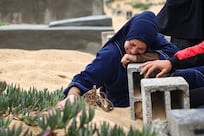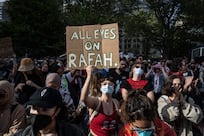A doctor standing still amid dimly-lit chaos and the cry of patients who do not have adequate access to medicines. Then comes the fateful sound of aircraft overhead and the flash of an attack. Dust and death follow.
It is hard to believe access to medical treatment is ostensibly a foremost principle of international law when such scenes are still being repeated daily in the Syrian civil war. Or that another principle is that medics on the battlefield should not be targeted. The fate of many of those who volunteered for the White Helmets proves to the contrary. The regime deliberately seeks to violate what were once sacrosanct rules.
These are crimes happening in plain sight. There is plenty of news coverage. Most of us see the pictures on social media every day, whether or not we are prepared to respond.
When the red carpet is rolled out for the Oscars ceremony in Hollywood tomorrow night, these crimes will be displayed on the most watched stage of all for a second year running. Last year The White Helmets documentary won the short factual film category.
Tomorrow Last Men in Aleppo is favoured to land a notable double in the full-length documentary feature category. It highlights the work of Mahmoud Al Hattar, a co-founder of the emergency response group, formed as the regime advanced in Aleppo in 2016.
The plaudits for the documentaries tell us something beyond the necessary coincidence of talented filmmaking and a strong storyline.
There is a purpose to the attacks. The deliberate assault on medics and clinics is designed to permanently change the country in favour of the regime.
Damascus does not seek victory over an uprising. It seeks to obliterate any chance that it will face a similar challenge in the future.
That is why the pockets under opposition control are repeatedly surrounded and besieged. And that is why the sieges are broken by crushing the spirit of the trapped. Destroying buildings where the injured or sick are gathered is a sought-after prize, not an accident. Ultimately, the attacks are about ensuring the displacement of opposition sympathisers forever.
The country’s make-up has been systematically and deliberately altered in favour of the regime through this strategy. Syrians who refuse to be ruled by the unreconstructed regime only face double jeopardy. They are first besieged, then dispersed, only to be attacked again. The sole alternative is to flee outside their country.
A permanent change in the make-up of Syria has been set in train. If it is not reversed, the legacy of the Syrian conflict will stem from the unforgivable crime of targeting hospitals and treatment centres.
A study by a Syria commission established by the Lancet magazine, published last year, estimated more than 800 health workers have been killed or persecuted and hundreds of health facilities destroyed since 2011. The scale is huge and undoubtedly has grown even larger since the figures emerged more than a year ago.
Over the course of the last month alone, the Lancet Commission counted 25 hospitals or facilities in Eastern Ghouta that had been hit. It said several of these sanctuaries had been attacked every few days.
It is important to consider these attacks when asking why diplomats are so woefully incapable of setting the terms for the end of the war. The cornerstone principle of most historic peacemaking endeavours is that crimes are consigned to the past. This would be the ultimate aspiration of the Russian-sponsored Astana process. It does not take a cynic to see it could also be the eventual landing point of UN’s Geneva negotiations.
International diplomacy and the political talks process have not put a halt to the crimes of the present –never mind the concept of ringfencing the deeds of past years. The incentive for Damascus to keep up its deadly tactics remains live and dangerous.
If Eastern Ghouta is obliterated like rebel parts of Aleppo, Homs and elsewhere, the pressure on Bashar Al Assad from within the state would ease markedly. Damascus gains and its rivals slip badly.
The regime has pioneered many innovative forms of warfare. Barrel bombs, for one, could only be an effective tool when targeting civilian gatherings like bread lines and vegetable markets.
A century after the First World War saw the first use of chemical weapons, Mr Al Assad brought back poison gas to the front line. Damascus has defied US strikes and the threat of more attacks to regularly use sarin and chlorine bombs.
The return to continual siege tactics is another. The military has repeatedly gambled that the key to breaking the population’s spirit is to take away access to medical treatment.
The prizes of Oscar night are not supposed to be about ending conflict and winning peace. Yet Hollywood has done a better job than the rest of us of giving recognition to the historic scale of suffering in Syria.





